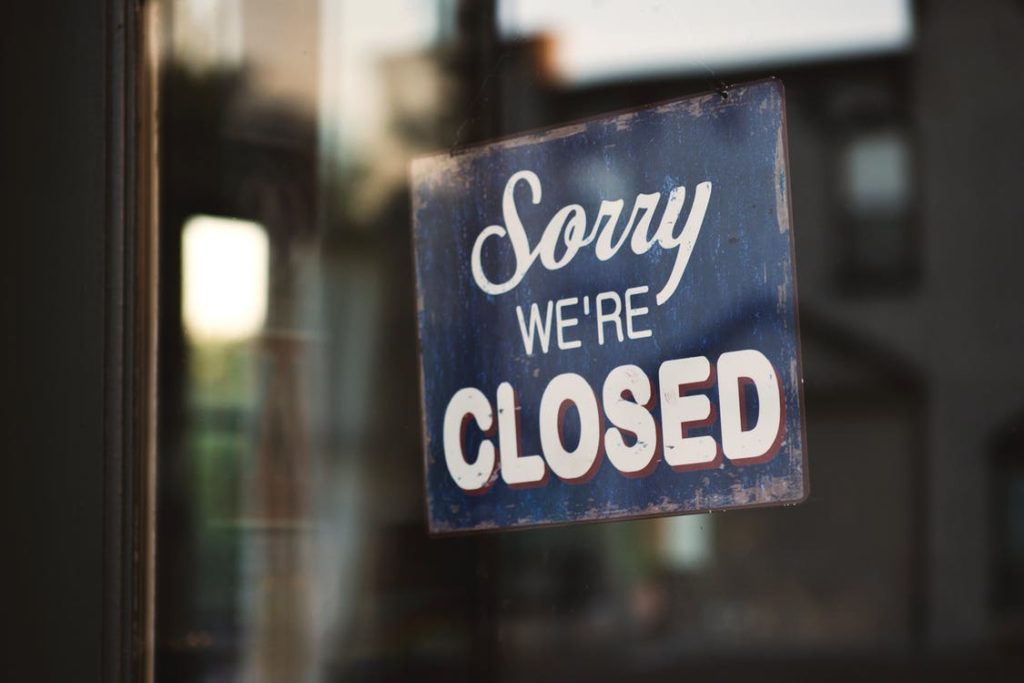Two of the focuses of my blog are Financial Literacy/Money and Business/Entrepreneurship. Most businesses fail which means that the odds are that you’ll confront this scenario should you seek to step into the arena of entrepreneurship. If in fact you are faced with this circumstance, it’s important to know how to proceed. The following contributed post is therefore entitled, Your Business Is Folding: The Steps To Take Next.
* * *
“Failure” is one word that no business owner wants to hear. However, it’s one of the biggest parts of being an entrepreneur. You are going to fail over and over again when you wade into the complicated world of business, and do you know what? Failure is okay. It’s not the end of the world if the business you are in is folding. Businesses fold because the needs of the consumer changes. Sometimes, a business can keep up with these changes and adapt. Other times, the business folds like a sheet of paper. The thing is, if you want to be a successful entrepreneur, the success isn’t hanging onto a failing business by a thread: it’s learning that you can brush yourself off and start over again.
It doesn’t mean that while you’re going through the folding of your company that you’re going to find it easy. In fact, much of the time it’s going to suck. It’s stressful and whether you are trying to let your employees know what’s going to happen to their jobs or you’re visiting www.daveburnslaw.com for information on company bankruptcy, you need to know the next steps that you’re going to take. No one wants to be at the helm of a business that is going under, but you learn a lot when your business folds. Think of it positively: you’ve witnessed the start and end of a business and you can pinpoint exactly where you have gone wrong. You’ve put a lot of effort into this company, and once you realise that it’s not the end of the world, you’re going to be able to look forward. It doesn’t mean that you personally are a failure: it simply means that you have a speed bump in the road that you are taking toward success. You learn your little lessons and you grow along the way.
The key is to know your next steps, stand tall and carry on. Let’s take a look at what you should be doing once your business has closed for good.

Take A Breath & Relax
Failure isn’t something that you can avoid at least once in your time as a business owner. It’s refreshing, to be honest, that there is an outcome for your business when you’ve been struggling to keep it alive. Stress comes in many forms, and it’s one of the many stressors out there when you are living in a perpetual state of uncertainty while you wait for your business to run its course. You don’t need to dwell on it, and when it’s final – your business is closing – you can let out the breath you’ve been holding. Calm down with some slow breaths and relax. Once you manage that, you can digest the situation far better and look at your experience in a new light. Perspective is an amazing thing, and it can propel your next business idea – after a break of course.
Don’t Take It To Heart
Rarely when a business folds is it about the owner. Your business may have failed, but that doesn’t mean that you did. Believing that you are the failure is a great way to kick yourself while you’re down, and you don’t need to do that. Bill Gates wasn’t an immediate success, neither was Steve Jobs. It’s your turn, though, to work out exactly what went wrong and rectify it for the next time, whether that’s issues with the product or service that you made or issues with the employees you hired. One you know what changed and ruined things, you can take the step to not let it happen again. Hindsight is a beautiful thing, right?

Adapt.
Reflecting on the loss of your business has to be an analytical thing. Here are some of the things that you can think about:
● Why did it fail?
● Could you have done more to save the company?
● Where did the fault lie?
Answering these questions can bring you the closure that you need, and you have learned from the experience. Reflect on the things that went right with it as well as the things that went wrong, and you’ll be able to adapt the next time you decide to open a business. This analysis can also prevent you from falling into a depression about your business – don’t let that happen!
Plan Again
You can take as much time out as you need to have a break when your business fails, but you also need to consider getting right back on the horse and planning another venture. You are now wiser and able to learn from your mistakes. Put everything you’ve learned into your new business and you’ll be able to be successful with it again.
Take A Break
After running a business, your confidence takes a knock. You’ve spent a long time at the wheel of a company and steered it well. Sure, things folded, but that doesn’t mean that it was all you. Before you jump in with both feet into the next venture, take a break and have some free time. You no longer have to devote every second of the day to your company. Not yet, anyway. Take a moment to go on that vacation you put off and spend time thinking and planning again. Recharge your batteries and catch up with yourself.
Do Some Volunteer Work
While you set up your next venture, take the time to do some volunteering. The passion that you feel about what you do is obvious, as you want to set up another business again. However, take some time to learn a little something new, to give back. You should hopefully have enough cash in savings to cover you a month or two, so take the time and learn something new.
A folded business isn’t going to ruin your entire life if you can appreciate that things will always be changing in the business world. Be excited: there is a bright future ahead of you that you can take with both hands.
